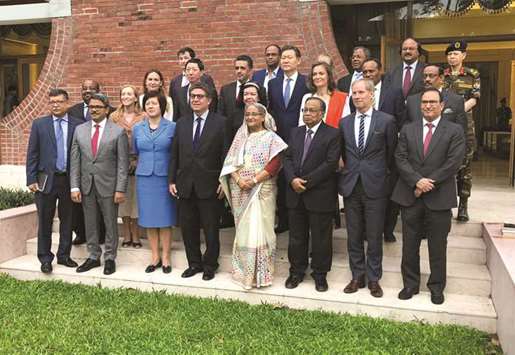Bangladesh Prime Minister Sheikh Hasina asked the UN Security Council yesterday to press Myanmar to take back hundreds of thousands of Rohingya Muslims who fled a military crackdown to take refuge in her country.
Security Council envoys visited Hasina in the Bangladeshi capital, Dhaka, before travelling to Myanmar for meetings with its government leader, Aung San Suu Kyi, and military Commander-in-Chief Min Aung Hlaing later yesterday.
“They should put more pressure on the Myanmar government so that they take their citizens back to their country. That’s what we want,” Hasina told reporters.
The visit by the Security Council envoys, to see the aftermath of a military operation in Myanmar’s western Rakhine State, puts a global spotlight on the crisis which the United Nations and others have denounced as ethnic cleansing of Rohingya Muslims.
Myanmar denies the accusation, saying the military was engaged in a legitimate
counter-insurgency operation.
Rohingya insurgent attacks on security posts in Rakhine State in August last year sparked the crackdown that, according to the UN and rights groups, sent nearly 700,000 Rohingya fleeing to camps in neighbouring Bangladesh.
Hasina said the refugees should return “under UN supervision where security and safety should be ensured”.
“They want to go back to their own country. So the Security Council can play a very pivotal role,” she added.
When asked if UN supervision meant the deployment of peacekeepers, Hasina said: “Not exactly, well, that the UN will decide”.
Myanmar government spokesman Zaw Htay did not immediately respond to requests for comment. Social Welfare Minister Win Myat Aye, who is leading rehabilitation efforts in Rakhine, declined to comment.
Kuwait’s UN ambassador Mansour al-Otaibi, one of the envoys, told Hasina the Security Council wanted to “send a clear strong message ... that we’re determined to end this humanitarian crisis”.
The envoys visited camps on Sunday, where distraught refugees pleaded for help ahead of the coming monsoon season. Many live in bamboo-and-plastic structures perched on hills in the southeast Bangladesh district of Cox’s Bazar.
Myanmar and Bangladesh agreed in January to complete the voluntary repatriation of the refugees within two years but differences between the two sides remain and implementation of the plan has been slow.
“We know there are difficulties in the talks between Bangladesh and Myanmar on the return of the refugees but it is important... to create the appropriate conditions for the refugees to go back freely and voluntarily to their home of origin,” said
al-Otaibi.
The envoys are due to travel to Rakhine State today.
The Security Council asked Myanmar in November to ensure no “further excessive use of military force” and to allow “freedom of movement, equal access to basic services, and equal access
to full citizenship for all”.
They will seek to push the Myanmar government to implement those requests, diplomats said.
Hasina also called on Myanmar to implement the recommendations of a commission headed by former UN secretary general Kofi Annan, which was appointed by Suu Kyi in 2016 to investigate how to solve Rakhine’s long-standing tensions.
Among the commission’s recommendations was a review of a Myanmar law that links citizenship and ethnicity and leaves most Rohingya stateless.
Buddhist-majority Myanmar has for years denied Rohingya citizenship, freedom of movement and access to basic services such as healthcare. Many in Myanmar regard Rohingya as illegal immigrants from mostly Muslim Bangladesh.

UN Security Council envoys pose for a photograph with Bangladeshi Prime Minister Sheikh Hasina after their meeting in Dhaka yesterday.
